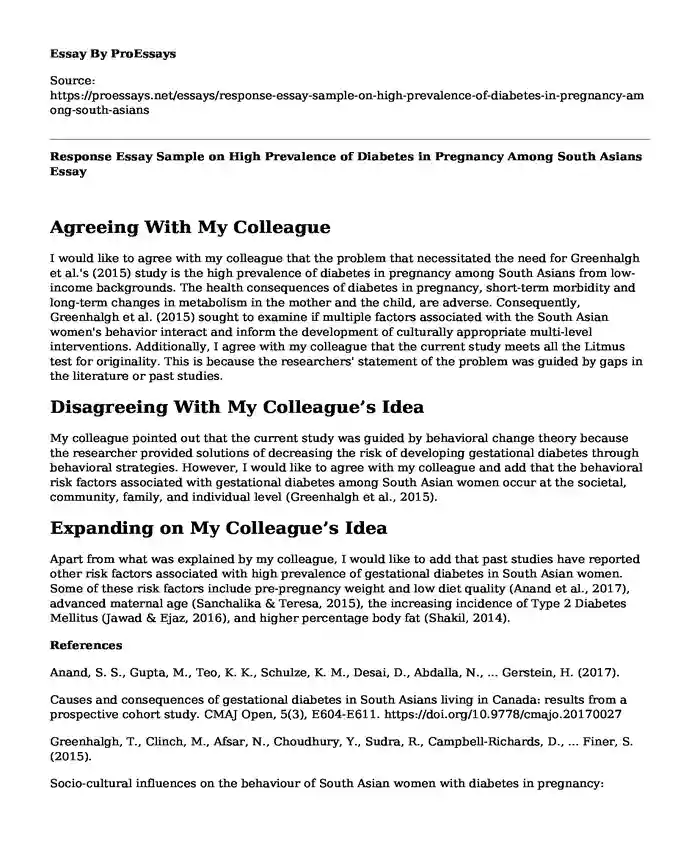Agreeing With My Colleague
I would like to agree with my colleague that the problem that necessitated the need for Greenhalgh et al.'s (2015) study is the high prevalence of diabetes in pregnancy among South Asians from low-income backgrounds. The health consequences of diabetes in pregnancy, short-term morbidity and long-term changes in metabolism in the mother and the child, are adverse. Consequently, Greenhalgh et al. (2015) sought to examine if multiple factors associated with the South Asian women's behavior interact and inform the development of culturally appropriate multi-level interventions. Additionally, I agree with my colleague that the current study meets all the Litmus test for originality. This is because the researchers' statement of the problem was guided by gaps in the literature or past studies.
Disagreeing With My Colleague’s Idea
My colleague pointed out that the current study was guided by behavioral change theory because the researcher provided solutions of decreasing the risk of developing gestational diabetes through behavioral strategies. However, I would like to agree with my colleague and add that the behavioral risk factors associated with gestational diabetes among South Asian women occur at the societal, community, family, and individual level (Greenhalgh et al., 2015).
Expanding on My Colleague’s Idea
Apart from what was explained by my colleague, I would like to add that past studies have reported other risk factors associated with high prevalence of gestational diabetes in South Asian women. Some of these risk factors include pre-pregnancy weight and low diet quality (Anand et al., 2017), advanced maternal age (Sanchalika & Teresa, 2015), the increasing incidence of Type 2 Diabetes Mellitus (Jawad & Ejaz, 2016), and higher percentage body fat (Shakil, 2014).
References
Anand, S. S., Gupta, M., Teo, K. K., Schulze, K. M., Desai, D., Abdalla, N., ... Gerstein, H. (2017).
Causes and consequences of gestational diabetes in South Asians living in Canada: results from a prospective cohort study. CMAJ Open, 5(3), E604-E611. https://doi.org/10.9778/cmajo.20170027
Greenhalgh, T., Clinch, M., Afsar, N., Choudhury, Y., Sudra, R., Campbell-Richards, D., ... Finer, S. (2015).
Socio-cultural influences on the behaviour of South Asian women with diabetes in pregnancy: qualitative study using a multi-level theoretical approach. BMC Medicine, 13. https://doi.org/10.1186/s12916-015-0360-1
Jawad, F., & Ejaz, K. (2016). Gestational diabetes mellitus in South Asia: Epidemiology. JPMA. The Journal of the Pakistan Medical Association, 66(9 Suppl 1), S5-7.
Sanchalika, A., & Teresa, J. (2015). Risk of gestational diabetes among South Asian immigrants living in new jersey-a retrospective data review. Journal of Racial and Ethnic Health Disparities, 2(4), 510-516. Shakil, A. (2014).
Ethnic differences in gestational diabetes identified by universal screening in routine antenatal care: A cross-sectional study (Master's thesis).
Cite this page
Response Essay Sample on High Prevalence of Diabetes in Pregnancy Among South Asians. (2022, Nov 01). Retrieved from https://proessays.net/essays/response-essay-sample-on-high-prevalence-of-diabetes-in-pregnancy-among-south-asians
If you are the original author of this essay and no longer wish to have it published on the ProEssays website, please click below to request its removal:
- Environmental Health: Air Pollution in the USA Essay
- Chronic Obstructive Pulmonary Disease Pathophysiology and Diagnosis - Paper Example
- Essay Sample on Empowering Elderly Wellbeing: Overcoming Challenges and Risks
- Essay Sample on Rural Bhutan: Quality Medical School & Hospital Benefits Local People
- Essay Sample on Appalachian Culture: Impact on Health & Wellbeing
- Essay on Nursing Informatics: Roles of a Nursing Leader in Data Analysis & Quality Care
- Essay Example on Woman With Chest Pains Seeks Medical Care: Physical Exam Results







